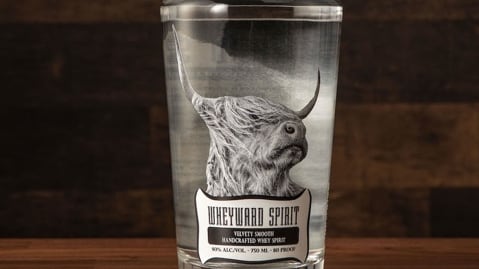The inspiration for Wheyward Spirit came to founder and CEO Emily Darchuk while waiting in line at the liquor store.
The young product development specialist with master’s degrees in food science and technology from Oregon State University and innovation and entrepreneurship from the University of Oregon had been contemplating possible remedies for the environmental havoc wrought by whey. Yes, whey—the cheesemaking residue that is arguably one of the nation’s most underutilized byproducts.
At the same time, Darchuk observed that the same handful of categories had been dominating the adult beverage market for more than a century. Why hadn’t some entrepreneur tried distilling, say, the untapped abundance of a nutrient-rich liquid currently clogging the American ecosystem to create a versatile, delicate, creamy but never cheesy, utterly new breed of liquor?
“We’ve fermented dairy for millennia,” marvels Darchuk, “but never as its own spirit with its own complexity and flavor and sippability.”
Initial test runs employed whey from local dairies, but Darchuk soon realized that her plans of scaling up production and releasing Wheyward as a national brand required greater capacity than Oregon farms could feasibly ensure. Although the spirit itself is now manufactured in California under her personal oversight, she remains committed to keeping Wheyward’s corporate headquarters in her adopted hometown.
“We’re trying to do things differently for the right reason,” Darchuk says, “and I think that’s Portland in a nutshell.”
As a boutique distillery specializing in European-style brandies dependent on locally sourced fresh fruit, Stone Barn uses the fallow stretch between February and May to produce an ever-changing array of whiskeys. By 2018, head distiller Andy Garrison had spent seven springs fermenting not-so-common grains (spelt, sorghum, millet). So when his wife shared that Lola Milholland, CEO of then-new noodle maker Umi Organic, had freezers full of failed attempts at fresh ramen, he leapt at the opportunity.
“I’d already experimented with turning day-old bread into whiskey,” shrugs Garrison. “Grain is grain.”
The chewy texture of traditional ramen noodles comes from an alkaline solution called kansui that, when fermented, imparts a distinct mineral aroma and “unplaceable noodly flavor” to the whiskey.
Given the heightened efficiency of Umi Organic’s kitchen, Garrison doubts they’ll have an opportunity to keep the business as a distilling partner.
“We got one last batch of yakisoba during the early stages of the pandemic, but resources were so scarce, we ended up turning them into hand sanitizer that we donated to farmers market vendors and delivery truck drivers,” he says. “Sanitizer is just alcohol, basically, plus a few additives. It still smelled like noodles.”
See all 25 Reasons to Love Portland here!

